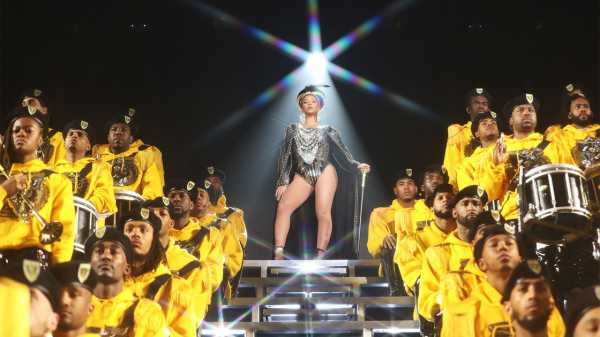
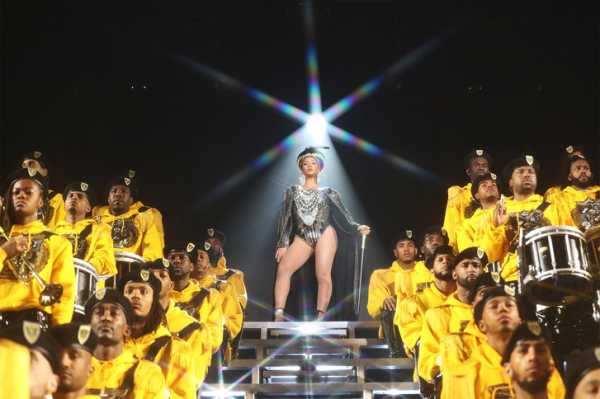
Beyoncé’s Coachella performance, her most comprehensive retrospective to date, underscored not only her Southernness but the global black vernacular that continues to shape her.
Photograph by Andrew White / Parkwood Entertainment
On Saturday, around 9 p.m., Pacific Time, I logged on to the Coachella live stream to await Beyoncé’s visit to the desert. Beyoncé was scheduled to play at 11:05 p.m. The three sisters of HAIM were opening on the main stage; after them, on a different stage, came the twenty-two-year-old Post Malone, a clever preacher of rich-kid chagrin, who moaned his hazy song about being a rock star as if it were a dirge. With his wiry hair and face tattoos, Post Malone augurs a new era of American white boy, one unconsciously beholden to black art forms but averse to acknowledging them. More and more, this is the Zeitgeist: blackness as fashion.
Beyoncé does not bend to trend. It was clear, when she took the stage, that she would serve as a corrective. She established her affiliation with the queen figure, emerging in a Nefertiti costume by Balmain. With a golden staff in hand, she cleared the catwalk to the exuberance of “Do Whatcha Wanna,” by New Orleans’s Rebirth Brass Band. (The sound reminded me of a night last summer, when I drifted, tipsy and full, into the Tremé bar owned by the band’s original jazz trumpeter, Kermit Ruffins, and witnessed his colorful rendition of Wiz Khalifa and Charlie Puth’s “See You Again.”) Behind her were bleachers stacked with dancers, drumlines, and a marching band arranged in a pyramid. This was maximalism of a gloriously disruptive intensity.
It was also an education in black expression. The lessons that Beyoncé received while growing up in Houston were the lessons that her parents received through the pride movements of the seventies. To preach these lessons at Coachella, where music is secondary to casual hedonism and faux bohemia, was a bracing act of subversion. Her performance, nearly two hours in length (she will repeat it next weekend), was rooted in feeling, specificity, and a keen sense of musical history—a mélange of New Orleans and its horns, Houston and its chopped and screwed beats, Brooklyn and its rap velocity, Kingston and its dancehall, and Nigeria and the legacy of its dissenter, Fela Kuti. To date, it was her most comprehensive retrospective, underscoring not only her Southernness but the global black vernacular that continues to shape her.
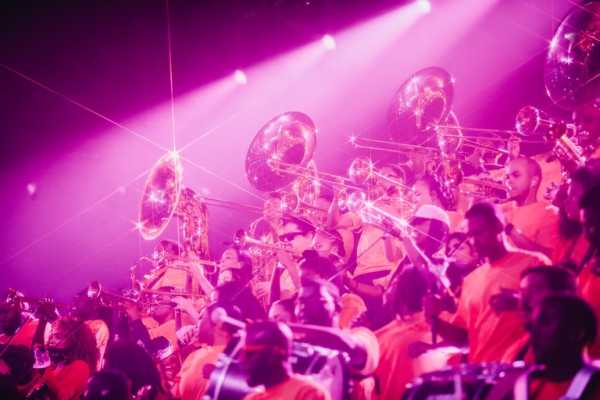
Photograph by Andrew White / Parkwood Entertainment
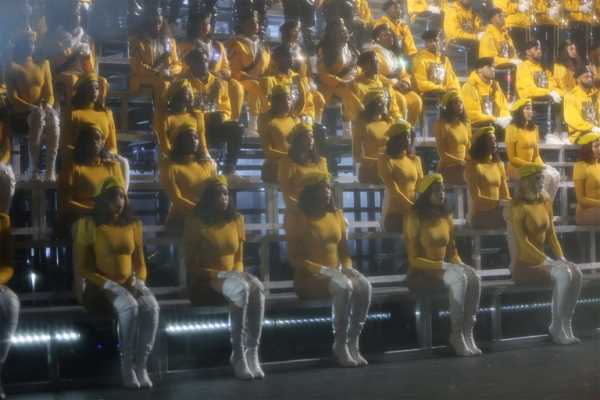
Photograph by Blaire Caldwell / Parkwood Entertainment
Beyoncé has a gift for turning black womanhood into a grand narrative, one worthy of metaphor. Two years ago, with “Lemonade,” she imagined a ghostly antebellum plantation as a site of female creativity; onstage at Coachella, that site became a fictionalized H.B.C.U. Her second outfit (there were five) transformed her into the leader of a sorority: in short shorts, fringed boots, and a yellow collegiate sweatshirt emblazoned with her crest, she roused the crowd with “Crazy in Love” and “Freedom,” before a solemn rendition of “Lift Every Voice and Sing,” commonly known as the black national anthem. In charming skits, she needled her male dancers—the first she’s had in years—as if they were neophytes. “Suck on my balls, pause,” they repeated after her, in a mesmerizing step show to “Sorry,” the unapologetic anthem from “Lemonade.”As she has grown older, Beyoncé has grown more deliberate in asserting her sexual authority. To the delight of the Internet, she integrated viral dances, such as the Milly Rock and the Nae Nae, into her routine. The tenacity of her choreography has long recalled the militant athleticism of the black majorette; at Coachella, the Nigerian singer Diddi Emah twirled a baton in one of the elaborately produced breaks.
In 2016, in the video for “Formation,” Beyoncé sank a police car into the waters of Louisiana—an image that suggested both the neglect of black people after Hurricane Katrina and the history of lost souls in the Atlantic. The day after that video was released, she performed the Super Bowl halftime show in Black Panther getup, and was labelled a cultural nuisance by police apologists and nervous music critics. Two years later, Beyoncé, always aware of the continuity of her story, let “Lift Every Voice” bleed into “Formation.” This was homecoming as dissent.
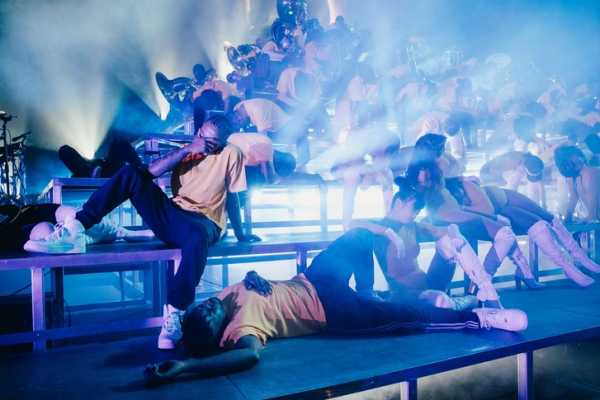
Photograph by Andrew White / Parkwood Entertainment
No other living pop star is as aware of her origin, or of the truth that any origin is porous and multiple. In using snippets from Outkast, Juvenile, C-Murder, Pastor Troy, Big Freedia, and D.R.A.M. as transitions in her arrangements, Beyoncé presented herself as the inheritor of a suite of black styles. She self-cited: during the final third of her set, Destiny’s Child reunited, producing rapturous harmonies sourced from the black church.When she invited her husband, Jay-Z, on stage, for “Déjà Vu,” she summoned not only the pathos of family but that of musical heritage. At one point, she stopped singing while two dancers performed in the near-dark to the sound of Nina Simone’s “Lilac Wine.” Later, she returned to the stage with her sister, Solange, for a point-for-point reënactment of their “Get Me Bodied” music video. Though Beyoncé is fluent in mythmaking, her performances are anchored by a perfectionist discipline. Whether you paid to see her or watched at home, it was impossible to find a single step out of place.
Beyoncé, the most compelling pop star of her generation, seems to have the touch of a conjurer. She knows the game. Branding this performance #Beychella is not merely social-media savvy; it’s a recognition that excelling at her art requires overpowering the arenas that would have the power to diminish her. “Thank you for allowing me to be the first black woman to headline Coachella,” she said, atop the pyramid, in the middle of her set. She added, with a smile, “Ain’t that a bitch?”
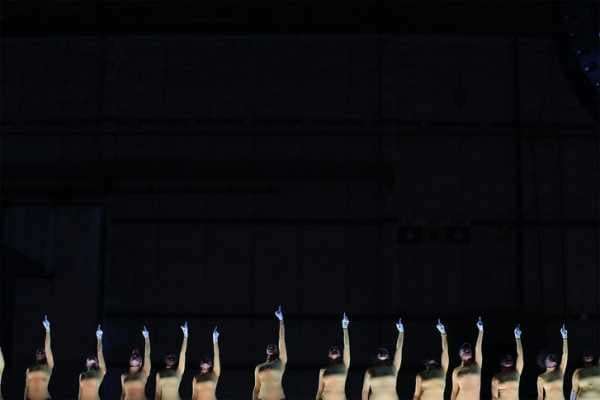
Photograph by Robin Harper / Parkwood Entertainment
Sourse: newyorker.com






